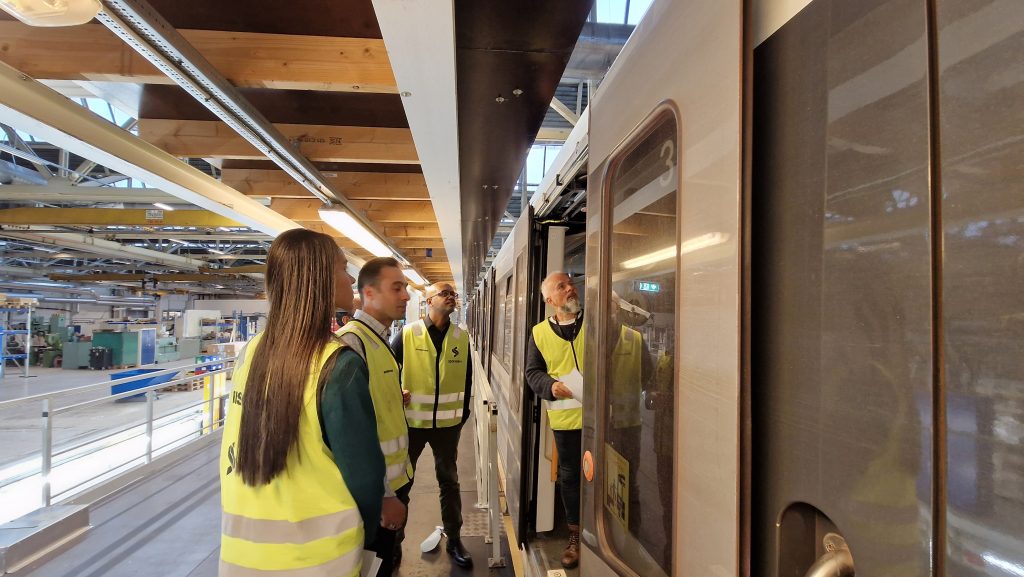
Sporveien v/ T-Bane workshop becomes part of the HSEIF consortium and becomes a partner in the project.
The aim is to acquire competence that can assist the company with further development within process development, organization and green digitalisation.
H-SEIF ( Human Systems-Engineering Innovation Framework ), is a research project where industry and academia work together to research methods and processes to make better use of data.
The project’s main goal is to strengthen the industrial partners who participate through co-creation, testing and validation of processes and systems that utilize big data.
An exciting project with many talented partners and people who we look forward to working with in the future, says Bjørn Stokkeland, business developer, at the Subway workshop in Sporveien AS. As a public actor, it is incredibly important for us to be connected to the latest in the technology of the future and to be close to the young and listen to their expertise.
HSEIF opens up precisely this possibility by, among other things, connecting several master’s students to relevant tasks in the project, says Stokkeland.
In the past year, HSEIF has, among other things, contributed to more than ten master’s theses which are further used as research material for doctoral students. These Master’s theses have also contributed to several new positions within big data solutions and sustainability.
Kongsberg Defense & Aerospace is one of the partner companies that has employed more resources as a result of a master’s thesis in HSEIF. The resources work with unique data information to develop expertise and create new and smarter solutions for the future. Read more here .
HSEIF’s social mission is to be an open consortium and a sharing arena. The companies present challenges and a research base for academia, and together we gather and share experiences that bring all participants forward in a sustainable direction, says Kristina Hesjedal Schnell, project manager at Semcon. Here Sporveien’s strategy and social mission of the most sustainable public transport for the money is spot on! We are very happy to have Sporveien with us as a new and valuable partner in the project, says Schnell.
Should reduce the costs of using big data
HSEIF, in collaboration with Sporveien, will, among other things, look at how to extract the necessary information from big data and use it to map maintenance and intervals for e.g. maintain the doors on the trains.

The costs of door maintenance have traditionally topped the statistics on costs of corrective maintenance. We have experienced that maintenance costs increased during the corona era. This is because the doors have been automatically opened at each stop due to the risk of infection, says Stokkeland. This has led to greater wear and tear and more maintenance hours.
What if we could measure noise from the various components at the same time as we collect different types of data that prevent replacement of door components?
This could enable greater utilization of the equipment by carrying out maintenance in a different way – more condition-based. This means that we minimize waste, and increase the sustainability of our work. It will also affect the disposal of parts. We will have great value from being able to map this information and plan maintenance in a different way to what we do today, says Stokkeland.
We look forward to working with all the actors in HSEIF and to see which errors and shortcomings can be solved by using data and digitalisation, he says.
Sporveien has available data that can be made available to the students, which can be broken down and further researched. As a public actor, they can share real user data where we can learn more about processes, organization and user patterns.
USN is concerned that the students work with real cases. Sporveien has been good at obtaining complete data sets, which is often in short supply, says Kristin Falk. She is Professor Systems Engineering & Subsea Systems at the University of Southeast Norway, Kongsberg.
Our students and professors in machine learning and computer science crave real data that they can use in teaching and research, while the Systems Engineering students collaborate with and do research directly inside the industrial companies, says Falk.
We look forward to continuing to share experiences that help strengthen our digital competence across the board! says Falk.
Partners in the project
- Kongsberg Defense and Aerospace, Kongsberg Maritime, Yeti Move, TechnipFMC, ECIT, P-plan, Kartverket, AHO, USN, Sporveien, Semcon and Kongsberg Innovation
- The project is financed by the Research Council of Norway
